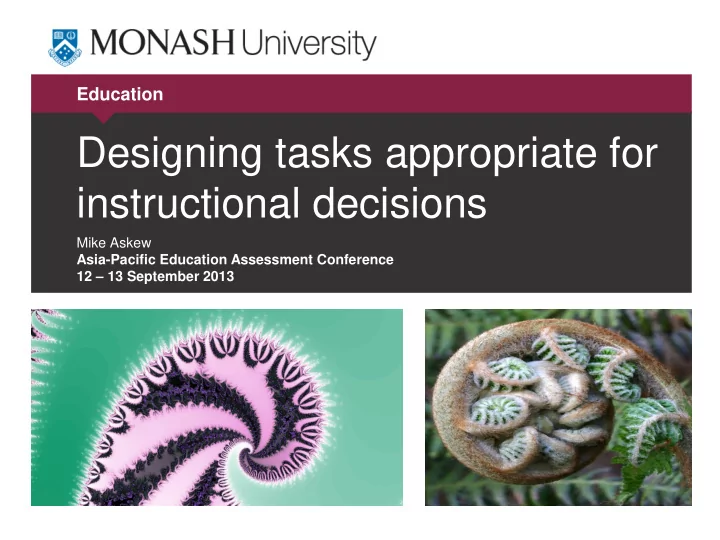

Education Designing tasks appropriate for instructional decisions Mike Askew Asia-Pacific Education Assessment Conference 12 – 13 September 2013
Purposes of assessment 2
Curriculum Intended Implemented Attained 3
Curriculum Implemented Attained Intended Formative Summative Select content assessment assessment 4
Curriculum Intended Implemented Attained 5
Assessments are … Representational not Literal 6
Generalise beyond behaviours When we assess students, we are never interested in how well they do on the actual items on which they were assessed; we are interested in how we can generalise beyond the behaviors observed on the assessment. Nuttall, 1987 7
Generalising from assessment 46 + 35 Sample of well-defined content 75 + 28 Remainder of that The 1000 addition facts content. of pairs of numbers to 100 8
The new average? Make no mistake about it, the higher- order skills – critical thinking and reasoning, problem solving, communication (including listening), collaboration, digitally-based learning, citizenship – will become the new average for the rest of this century. Fullan, 2011
Objects of learning • Skills • Critical thinking Indirect CONSTRUCT • Problem solving • Reasoning • Fractions • Photosynthesis Direct CONTENT • Suez Canal 11
Construct A (usually) unobservable trait – Problem solving – Reasoning – Critical thinking No single empirical measure Cronbach & Meehl, 1955 12
Defining constructs Constitutively – In terms of other constructs Operationally – What to observe and measure 13
Character and citizenship education • Resilience • Leadership Indirect CONSTRUCT • Serving community • ?? • ?? ?? 14
Character and citizenship education • Resilience • Leadership Indirect CONSTRUCT • Serving community • Video gaming?? • Volunteering?? Direct CONTENT • ?? 15
Tool and result The search for method becomes one of the most important problems of the entire enterprise of understanding the uniquely human forms of psychological activity. In this case, the method is simultaneously prerequisite and product, the tool and result of the study. Vygotsky, 1978 17
Problem solving Gilbert and Hazel have some postcards. After Gilbert give 18 postcards to Hazel, he has 20 postcards more than her. How many more postcards than Hazel does Gilbert have at first? Peta has some plums to give to her friends. If she gives each friend 4 plums, she will have 6 plums over. She cannot give each friend 5 plums because she would need 4 more plums. How many plums does Peta have? 18
Given 86 + 57 = 143 Quickly figure out Correct at end of primary 57 + 86 91% 143 - 86 80% 86 + 86 + 57 + 57 79% 860 + 570 76% 19
“Backward” design Identify Determine Plan desired acceptable learning outcome evidence opportunities Wiggins & McTighe 20
Singapore Mathematics 2013: Process Identify Determine Plan desired acceptable learning outcome evidence experiences Observe Reasoning ? patterns 21
Singapore Mathematics 2013: Content Identify Determine Plan desired acceptable learning outcome evidence opportunities Concept Make + / ? of + / - - stories 22
Example: Compare two fractions Choice of G5 success fractions rate 7/8 5/8 > 90% 5/7 5/9 < 20% 23
Measurement and geometry Connect three-dimensional objects with their nets and other two-dimensional representations
Objects of learning Indirect – Skills – Reasoning – Problem solving Direct – Connect three-dimensional objects with their nets and other two-dimensional representations
Objects of learning Indirect – Skills • Using measuring tools accurately • Compass and ruler constructions Direct – Connect three-dimensional objects with their nets and other two-dimensional representations
Objects of learning Indirect – Problem solving • Imagine you are a box manufacturer. Which net wastes least card? Direct – Connect three-dimensional objects with their nets and other two-dimensional representations
Objects of learning Indirect – Reasoning Which of these nets will not fold up to make a cube? Direct – Connect three-dimensional objects with their nets and other two-dimensional representati ons
Threats Construct under-representation Construct irrelevant variance Messick, 1980 29
Construct under-representation Pre-test Correct 8 + 4 = [ ] + 5 58% 32 + 19 = [ ] + 20 53% 68 - 39 = [ ] - 40 26% 30
Construct irrelevant variance? When a number is divided by 3, the remainder is 2. When the same number is divided by 4, the remainder is also 2. Find the number. Peta has some plums to give to her friends. If she gives each friend 4 plums, she will have 6 plums over. She cannot give each friend 5 plums because she would need 4 more plums. How many plums does Peta have? 31
Construct irrelevance variance? There were ¾ as many chocolates in Miss Churcher’s box as there were in Miss Goder’s . ½ of the sweets in Miss C’s box were eaten and 3/8 of Miss G’s box were eaten. There were 152 chocolates altogther (left over). How many sweets were in each box to start? 32
Overlooked purpose Intended curriculum Attained curriculum ASSESSMENT Making learning outcomes operational 33
References Cronbach, L. J., & Meehl, P. E. (1955). Construct validity in psychological tests. Psychologica lBulletin, 52, 281 – 302 Fullan, M. (2011). Choosing the wrong drivers for whole system reform. (Seminar Series Paper No. 204) . Melbourne: Centre for Strategic Education. McTighe, J., & Wiggins, G. (1999). The understanding by design . Association for Supervision & Curriculum Development. Messick, S. (1980). Test validity and the ethics of assessment. The American Psychologist, 35,1012 – 1027 Nuttall, D. L. (1987). The validity of assessments. European Journal of Psychology of Education,2, 109 – 118. 34
Recommend
More recommend